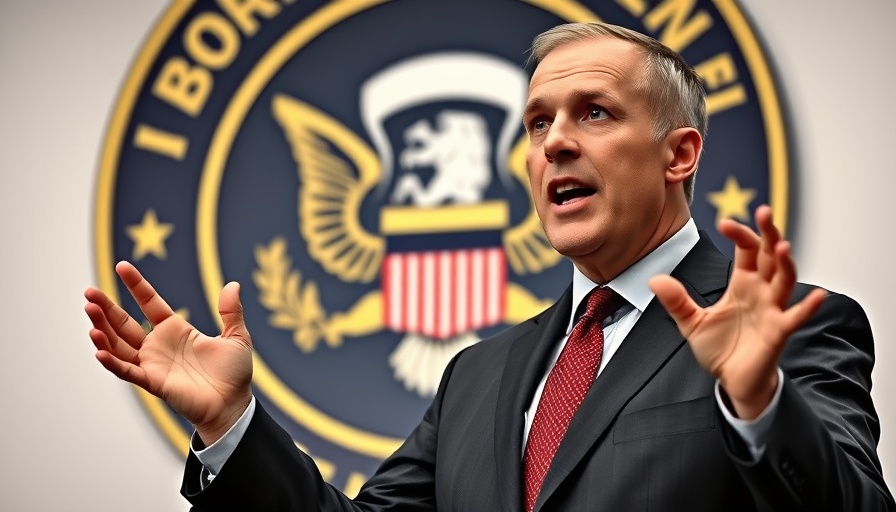
Gavin Newsom's Stance Against Trump's Immigration Tactics
In a powerful speech delivered in Los Angeles, California Governor Gavin Newsom maintained that democracy is facing unprecedented challenges, attributing part of this degradation to President Donald Trump's immigration enforcement methods. Amid rising tensions marked by protests across various cities, Newsom articulated his concern that Trump's tactics, including the federal deployment of the National Guard and Marines, symbolize an attack on democratic principles.
The Growing Unrest Across the Nation
Newsom's comments come in the wake of escalating protests against Trump’s immigration policies, which have not only sparked demonstrations in Los Angeles but also in cities nationwide, including New York, Chicago, Dallas, and Atlanta. The protests have gathered momentum following the president's controversial immigration enforcement strategies, which many view as both draconian and detrimental to democratic norms.
The LAPD reported over 378 arrests since the protests began, highlighting a significant surge in unrest that has prompted curfews in the downtown area. This collective backlash against Trump’s policies reflects a growing frustration within the American populace, emphasizing that the unrest is about more than just immigration; it embodies a broader struggle to uphold democratic ideals.
What Newsom’s Warnings Reveal About the Future of Democracy
Newsom characterised the moment as one foreseen by critics of authoritarian regimes, stressing that such governments often initiate their tyranny by targeting vulnerable populations. By framing his narrative around the possible erosion of democracy, he effectively intersects the issues of civil rights, immigration enforcement, and national security, calling for unity and vigilance among citizens.
“This is about all of us. California may be first, but it clearly will not end here. Other states are next. Democracy is next. Democracy is under assault before our eyes,” Newsom proclaimed, urging individuals to recognize the potential fallout of the current political climate.
Authoritarianism: The Bigger Picture Behind Immigration Policies
Newsom's critique of Trump’s rhetoric hinges on the notion that division facilitates control and power grabbing. By suggesting that the former president encourages violence “as long as it serves him,” he not only distances himself from Trump’s tactics but also positions himself as a champion for democracy.
These remarks come at a pivotal time when the divisive actions of political leaders lead to questions about the future of governance in the United States. Critics of Trump have voiced concerns that the normalisation of undermining civil liberties could set dangerous precedents for future administrations, irrespective of party affiliation.
The Role of Law Enforcement in Political Controversies
With the National Guard's involvement in quelling protests, a significant debate arises regarding the militarisation of law enforcement and the implications it has for civil rights. The President's decision to deploy federal troops without a request from local leaders has raised eyebrows regarding the use of state power against its citizens.
This kind of government intervention underscores a growing trend where law enforcement is perceived not merely as a protective force but as a means to exert control over dissent. Experts warn that this could promote a culture of fear rather than one of safety and security, leaving citizens questioning their liberties under a federal regime.
Emotional Impact and the Human Element
The protests echo a broader struggle and anxiety felt by many Americans about their rights and the direction of their country. As we witness these events unfold, it is vital to remember the human aspect of such debates. Families affected by immigration policies, children witnessing unrest, and communities facing a fracturing social fabric all contribute to a narrative that is not just political — it is deeply personal.
Protesters being dragged from their homes during enforcement actions do not just represent statistics; they are individuals with stories and aspirations, reminding us of the importance of placing humanity at the center of all political discussions.
Path Forward: The Call to Action for Citizens
The call to action is clear: citizens must remain engaged, informed, and united against divisive rhetoric and actions that threaten to undermine the democracy we cherish. Political leaders, activists, and community members must work together to advocate for fair and humane immigration policies that reflect the values of equity and justice.
Staying informed about local and national issues, participating in community organizing, and advocating for representation in local and federal government are all actionable steps that citizens can take to ensure that democracy thrives, even in turbulent times. The struggle for civil rights is ongoing, and history shows that unity is a powerful force in enacting change.
Final Reflections
Newsom’s speech serves as a vital reminder of the delicate balance between authority and the rights of the individual. As challenges to democracy grow, we must also remain vigilant about the policies that shape our society. As citizens, we hold the power to influence the system, advocating for a future rooted in fairness, equality, and respect for all.
 Add Row
Add Row  Add
Add 




 Add Row
Add Row  Add
Add 

Write A Comment